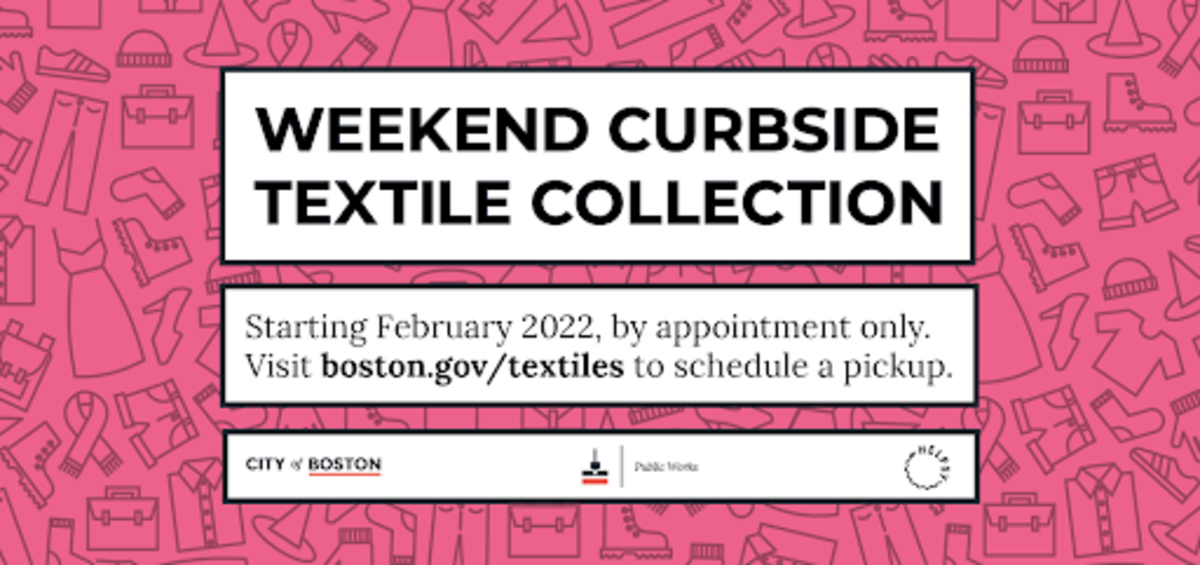Boston to Offer Residents Weekend Curbside Textile Collection
The program builds on the already 30 textile dropbox locations across the City.
Building on the success of the neighborhood textile dropbox program, Mayor Michelle Wu announced today that the City of Boston will begin offering weekend curbside collection of household textiles at no cost to residents. The Boston Public Works Department has again partnered with Northeast textile recycling company, Helpsy, which will coordinate pick-ups across the city.
“Bringing a curbside textile recycling program to Boston is an important step towards making waste reduction practices equitable and accessible for all our residents,” said Mayor Michelle Wu. “By empowering our residents to take bold action against climate change and finding innovative and convenient ways to recycle, we’re creating a cleaner, more sustainable city for future generations to come.”
Residents looking to schedule a pick-up can simply fill-out an online request form at boston.gov/textiles. Once a date is scheduled and confirmed, household textiles should be left on the curb by 7:00 a.m. on the scheduled pick-up day. Textiles should be clean, dry, and properly bagged to allow for a quick pick-up for Helpsy drivers. Acceptable textile items include dresses, shirts, pants, suits, coats, towels, bedding, costumes, curtains, placements, tablecloths and throw rugs. Items that will not be accepted include breakable houseware or glass, electronics, furniture, construction materiel, scrap metal, appliances, mattresses, books or magazines.
Once household textiles are collected, sorted and graded, 95 percent will be reused, upcycled, or recycled. The higher grades are resold to thrift stores in North America and other second hand markets around the world. The lower grades get turned into rags for industrial use or alternative functions like stuffing or insulation. In just the last year, Helpsy has collected and processed over 30 million pounds of textiles from the Northeast region. Of that, 5 million pounds were generated from the Greater Boston area.
“The City of Boston is always looking for new and creative ways to expand recycling services to our residents,“ stated Superintendent of Waste Reduction, Brian Coughlin. “We not only want to provide convenient programs that work for everyone, but also educate residents on why and how these programs will assist in our ultimate goal of becoming a zero waste city.”
According to the Environmental Protection Agency, textile waste is one of the fastest growing waste streams in the United States, occupying nearly 5 percent of all landfill space. As a country, the U.S. throws away 36 billion pounds of textiles each year, nearly 100 pounds per person. Of those discarded textiles, currently only 15 percent is recycled, whereas 95 percent could be.
Along with weekend curbside collection, residents can also drop off their textiles at 30 dropbox locations across the city. Dropboxes are located at city owned municipal lots, as well as Boston Public School and Boston Housing Authority locations. You can find a full list of locations and accepted items here.
The City of Boston continues to encourage residents to utilize tools like the City’s free “Trash Day” app. The app enables Boston residents to search a directory of hundreds of household items to find out the right way to dispose of them while on the go or at home. App users can also view a calendar for their home’s collection dates, set reminders, and get notifications of schedule changes to service. Boston residents can also safely dispose of hazardous waste, shred unwanted documents, discard textiles and recycle electronics for free at a series of Household Hazardous Waste Drop-Off events.
These programs build on Boston’s Zero Waste Plan, which includes 30 near- and long-term strategies to divert at least 80 percent of the City’s waste from landfills and municipal solid waste combustors by 2035. Key pieces of the plan include expanding Boston’s composting program, increasing access to recycling opportunities and launching a city-wide education campaign on recycling. Greenhouse gas emissions from waste disposal is equivalent to approximately six percent of Boston’s overall emissions. By reducing waste, recycling more, and composting, Boston can reduce emissions associated with waste and move one step closer to its goal of carbon neutrality by 2050, outlined in the City’s 2019 Climate Action Plan update.
While reducing emissions, the City is working to prepare for sea level rise and the impacts of climate change. Climate Ready Boston is the City's initiative to prepare for the short and long term impacts of climate change. In addition to citywide climate resilience plans, the City has created neighborhood-level coastal resilience plans for areas most vulnerable to sea level rise and coastal storms, including East Boston, Charlestown, South Boston, North End, Downtown, and Dorchester.
This expansion reinforces the Wu Administration’s commitment to a Boston Green New Deal and creating sustainable recycling and waste disposal resources. Additionally, Mayor Wu signed an ordinance to divest City-funds from the fossil fuel, tobacco, and private prison industries. Mayor Wu also announced new, lower community choice electricity rates and outlined steps to reduce vehicle emissions and electrify the City fleet. Mayor Wu additionally announced the launch of the two-year fare-free program on MBTA bus Routes 23, 28, and 29 on March 1, 2022.


